“All Good Things…”
Written by Ronald D. Moore & Brannon Braga
Directed by Winrich Kolbe
Season 7, Episode 25
Production episode 40277-747
Original air date: May 23, 1994
Stardate: 47988.0
Captain’s Log: Worf and Troi have just finished a date on the holodeck, and their goodnight kiss is interrupted by Picard in his bedclothes wanting to know what the date is. He’s been moving back and forth in time. He can’t remember specifics—one moment he was in the past some time, before he took command of the Enterprise, talking to someone; another moment he was in the future, somewhere outdoors. His fleeting memories have such vivid sense impressions that they must be far more than a dream.
While he’s in the middle of describing it to Troi, he finds himself standing in a vineyard twenty-five years in the future. He’s interrupted in the tending of his vines by a visit from La Forge. Both men have facial hair—Picard is bearded and is retired from his ambassadorial career, La Forge has a mustache (and bionic eyes). La Forge’s wife Leah heard that Picard had been diagnosed with Irumodic Syndrome, and La Forge wanted to check in on him.
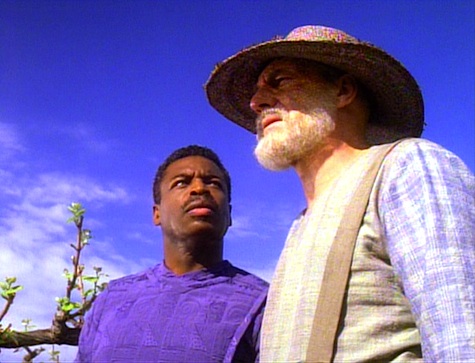
Picard and La Forge head back to the house, but then Picard sees three people in rags jumping up and down and shouting. Then he finds himself suddenly on a shuttle with Yar, heading to the Enterprise for the first time to take command shortly before “Encounter at Farpoint.” Just as the shuttle approaches the ship, he’s back in the present, telling Troi that he just saw Yar.
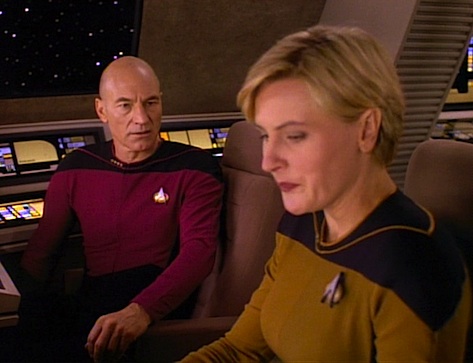
Crusher examines Picard and finds nothing. No indication of time travel, no indication that he’s even been off the ship. She also scans for Irumodic Syndrome, and doesn’t find it, but she does find a defect in his parietal lobe that could, down the line, lead to a disorder, including Irumodic.
Picard gets new orders from Admiral Nakamura: the Romulans have diverted 30 warbirds to the Neutral Zone, and they’ve picked up an anomaly in the Devron system in the zone. Nakamura’s sending 15 ships to respond, including the Enterprise, which is specifically tasked with examining the anomaly in Devron.
The future: Picard is back in the vineyard, insisting to La Forge that he was somewhere else with the same intensity that he insisted to Troi in the present. He wants to see Data, and La Forge agrees to, though he’s obviously worried. Picard is also still seeing the people in rags.
Data is now the Lucasian Chair at Cambridge, and La Forge and Picard visit him at his residence. Data is willing to give Picard the benefit of the doubt and will use the equipment at Cambridge to examine him.
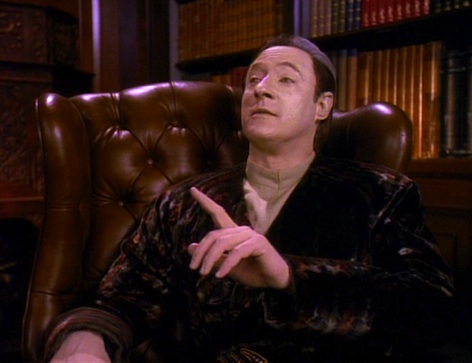
The past: Picard is formally taking command of the Enterprise, reading his orders—but he also sees the people in rags again, this time on the upper level of the shuttle bay and in the shuttle. Various crewmembers—Troi in her miniskirt, Worf in his cloth sash, and O’Brien in a red uniform, along with Yar and others—are there for the command-taking ceremony. Then he orders the ship to red alert, confusing the hell out of everybody.
Yar and Worf perform scans that reveal nothing unusual, and Troi doesn’t sense anything. O’Brien then informs Picard that Starfleet has cancelled their mission to Farpoint Station and ordered them to report to the Neutral Zone to investigate an anomaly in the Devron system. Picard, however, will continue with the mission to Farpoint. He assigns an engineering task to O’Brien, and also meets up with Data.
The present: Picard is retaining more memories with each time shift. Crusher performs a scan, and while there’s no other physical manifestation of the time shifts, Picard’s brain has accumulated over two days worth of memories in the five minutes since she last examined him.
Picard meets with the senior staff, expressing concern, especially since the events he’s experiencing in the past don’t match what actually happened. While the Enterprise continues to prepare for whatever they might find at the Neutral Zone, Crusher orders Picard to get some rest. She’s worried about him, and actually kisses him.
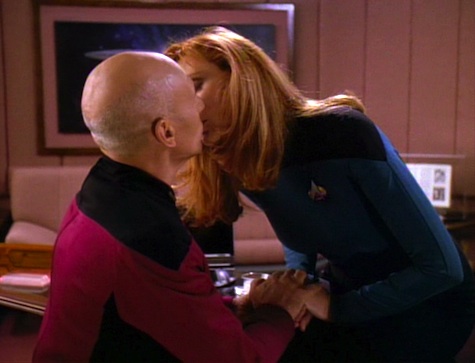
The future: Picard wakes from a nap and insists that they have to get to the Devron system. The problem is, that’s not in the Neutral Zone anymore, it’s in Klingon space, ever since the Klingons conquered the Romulan Empire, and the Klingons have closed their borders to Federation ships. La Forge and Data go along with the notion. However, they need a ship. They ask Admiral Riker, but all he can do is send the Yorktown to check the system.
Data has another solution: the Klingons have allowed medical ships to cross the border since an outbreak of Terellian plague on Romulus. They contact the U.S.S. Pasteur, a medical vessel commanded by Crusher—the captain’s ex-wife.
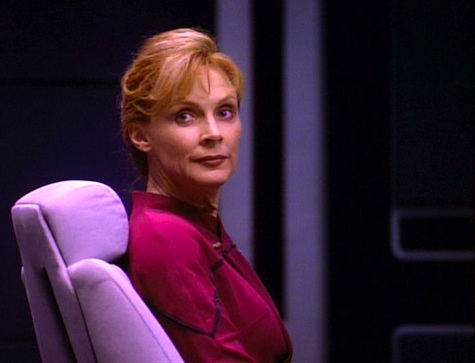
Once Picard goes to get some rest, Crusher, Data, and La Forge admit that they don’t entirely believe him, but, as Crusher says, he’s Jean-Luc Picard, and if he wants to go on one final mission, then that’s what they’ll do.
The past: The Enterprise heads toward Farpoint Station, but Picard is annoyed to find that Q hasn’t materialized the way he did in “Encounter at Farpoint.” Data doesn’t detect Q’s force field, Troi doesn’t sense anything, and Picard is frustrated. He goes into his ready room.
The present (kinda): Picard finds himself back in the 21st-century courtroom where Q put humanity on trial back in “Encounter at Farpoint.” Q’s back in his judge’s robes and refuses to explain what’s going on—but does agree to answer any questions Picard has, as long as it has a yes or no answer.
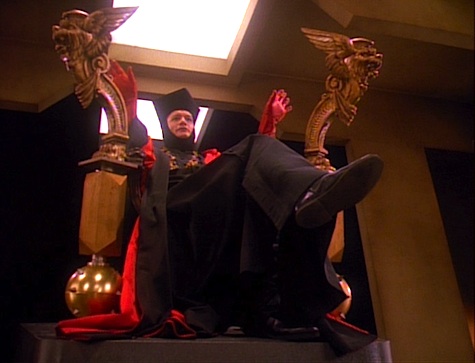
Is he putting humanity on trial again? No. Is there a connection between the trial seven years previous and what’s happening now? Yes. Is the Devron anomaly part of what’s going on? Yes. Is it a Romulan plot to start a war? No. Did Q create the anomaly? No. Is Q responsible for Picard’s time shifts? Yes.
When Picard asks why, Q says that isn’t a yes-or-no question, and he refuses to answer any further questions.
Q reveals that the trial never ended—until now. They find humanity guilty of inferiority. And humanity will be wiped out—but not by Q. No, Picard will be responsible for the destruction of the human race. And then he adjourns the court.
Picard is back on the Enterprise, and calls for red alert. They agree not to second guess themselves and simply proceed as normal. They arrive at the Neutral Zone, alongside the Concord and Bozeman—while three warbirds are aligned on the opposite side. Picard orders Worf to hail them.
The future: Worf answers the Pasteur’s hail. He is now the governor of H’atoria, a minor planet near the Federation border, and is no longer a member of the High Council as Picard and the others had believed. Worf cannot allow them passage, as it’s too dangerous and would be against regulations. Picard plays on his sense of honor, just like he always does, and Worf gives in, just like he always does, and grants permission—but only if he comes on board.
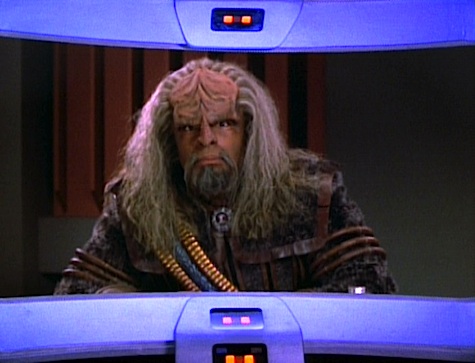
The past: Picard has given up on finding Q and orders O’Brien to head to the Devron system. Troi expresses concern over his bizarre orders, but Picard feels he has no choice. He also contacts Riker on Farpoint Station, saying that they’ll be delayed indefinitely. Troi also takes advantage of the opportunity to tell Picard that she and Riker had a previous relationship.
The present: Picard speaks with Commander Tomalak, and they agree to each send one ship into the Zone to investigate the anomaly in Devron. (Tomalak is particularly amenable once Picard admits that the plan isn’t sanctioned by Starfleet Command.) They detect a subspace anomaly, and Picard orders it to be examined.
The past: The Enterprise arrives at the Devron system to find the same anomaly, but it’s much larger in the past than it is in the present.
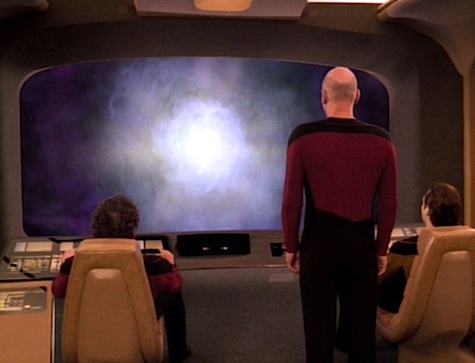
The future: The Pasteur arrives at the Devron system to find—nothing. Data searches thoroughly, and comes up with a modification—an inverse-tachyon pulse—that will enable an even more thorough search. But Worf reports that some Klingon warships are headed to this system to go after a renegade Federation ship, so Crusher will only stay for six hours before leaving the system.
Q appears as an older man and reminds Picard that what he was and what he will be will inform his decision, and also reminds him that he will destroy humanity.
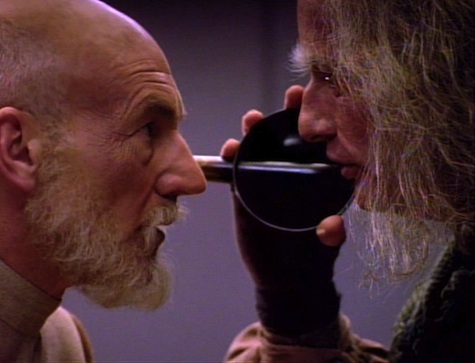
The present: Data reports that the anomaly is putting out tremendous energy. Picard suggests the same inverse-tachyon pulse that future-Data made on the Pasteur to more thoroughly scan the anomaly.
As soon as the pulse starts, La Forge’s optic nerves start regenerating. Ogawa reports that two crewmembers have had old scars heal by themselves. Data reveals that the anomaly is an eruption of “anti-time,” a relatively new theory. The rupture is the result of a collision between time and anti-time.
The past: Picard again suggests an inverse-tachyon pulse to Data, who is unfamiliar with the theory of anti-time. Picard quickly says he doesn’t have time to explain, but orders Data to make the modifications.
The future: The Pasteur is attacked by two Klingon attack cruisers. Just before they’re destroyed, the Enterprise (with a third nacelle and with Riker in charge) decloaks and drives the Klingons off. But the Pasteur is too badly damaged, and explodes, after Riker has the entire crew beamed off. Riker takes Worf to task for letting a defenseless ship into hostile space, and Worf counters that if Riker had helped Picard when he asked him, this wouldn’t have happened.
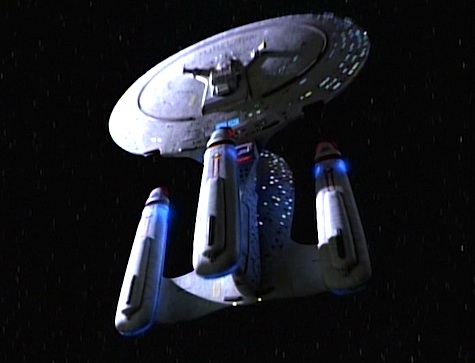
Picard insists on staying to find out where the anomaly is, but Riker won’t hang around. Crusher sedates him to shut him up.
The present: La Forge’s eyes are regenerating, and he no longer even needs his VISOR. Unfortunately, the news is less pleasant for Ogawa—her pregnancy has miscarried. The anti-time caused the fetal tissue to revert.
Picard orders Data to try to find a way to collapse the anomaly before it starts killing the crew. Q then appears and tells Picard that it’s a ballsy decision to mess with an anomaly he knows nothing about. To ease the decision, Q takes Picard to prehistoric Earth, just before life ever formed on the planet. The anomaly is visible in the entire Earth sky, having grown to encompass much of the Alpha Quadrant.
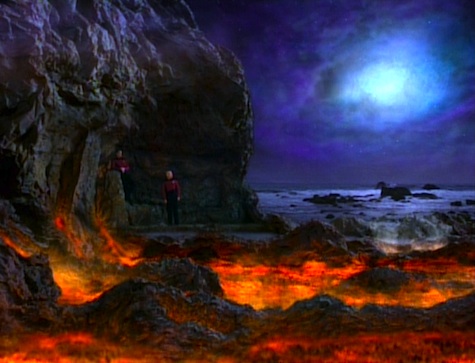
Q shows him a pile of goo that would be where amino acids formed the first protein, thus starting the process of life on Earth—but the anomaly prevents that from happening. And, as Q keeps insisting, Picard caused it.
The past: Picard, Data, and O’Brien speculate on how to scan the anomaly more thoroughly. Data mentions a tomographic imaging scanner that is in development at the Daystrom Institute.
The present: Seven years later, Daystrom has developed it, and they have one on the Enterprise. Data uses it and discovers three tachyon pulses, all identical, all coming from the Enterprise. (Of course, one of them should be different, coming as it does from the Pasteur, but we’ll let that go.)
The future: Riker shares a drink in Ten-Forward with La Forge, Data, and Crusher. Worf sits off on his own. He and Riker have been on the outs for 20 years. Riker says he tried to reconcile at Troi’s funeral, but Worf wouldn’t even talk to him. Riker admits that in the back of his mind he always thought he’d get back together with Troi, and he admits that he got in the way of Worf and Troi truly becoming a couple.
Picard shows up in Ten-Forward, insisting that the Pasteur’s tachyon pulse caused the anomaly. Data backs him up enough that Riker is willing to go back to the Devron system to check it out. Riker also invites Worf to join them on the bridge.
Sure enough, there’s a tiny subspace anomaly: an anti-time eruption. Data theorizes that cutting off the tachyon pulses might do the trick.
The past and the present: Picard orders the tachyon pulses to be disengaged twice over, but it doesn’t have an effect.
The future: Data and La Forge theorize that the Enterprise would need to enter the anomaly and form a static warp shell, which would collapse the anomaly—but the other two Enterprises would need to do it as well.
The past: Picard orders the ship into the center of the anomaly, at which the crew balks. Yar expresses the confusion that everyone’s feeling. This new captain they don’t know has been acting beyond bizarre, and now he’s ordering the ship into a dangerous anomaly. Picard speechifies, telling the crew how awesome they are, and they go in.
The present: Picard sends the Enterprise in.
The three ships all encounter each other in the center of the anomaly, all forming their static warp shells. The anomaly starts to collapse, but not before each of the Enterprises goes boom.
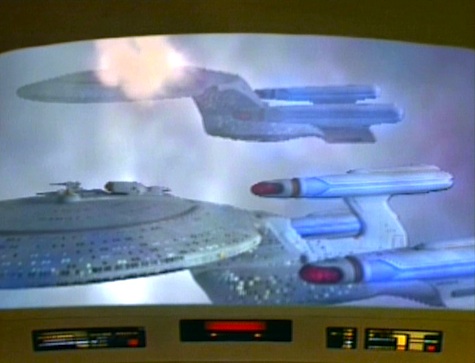
Picard wakes up in the courtroom. Q assures him that he’s saved humanity. Q reveals that putting humanity through this test was under orders from the Continuum—but tossing Picard around through the timelines was Q’s idea, and Picard thanks him for it.
Q also says that the trial never ends—but the point is for humanity to explore, not star systems and nebulae, but the possibilities of existence.
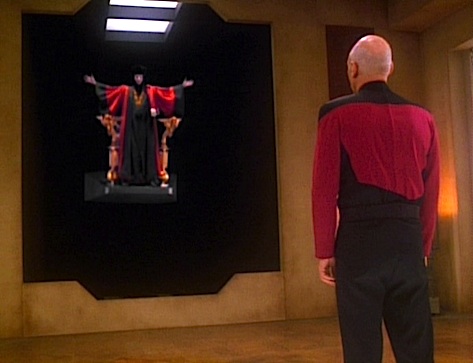
Picard winds up back on the Enterprise, back in his bathrobe, asking an about-to-smooch Worf and Troi what the date is. And like Scrooge, he realizes that it was all the same night. Nobody else remembers anything that happened, and there’s no anomaly in the Devron system.
Later, Picard—who told the crew about what he saw in the future—walks in on the poker game and asks to be dealt in, saying it’s something he should have done long ago.
Data gives him the cards to deal, and Picard calls five card stud, nothing wild—“and the sky’s the limit.”
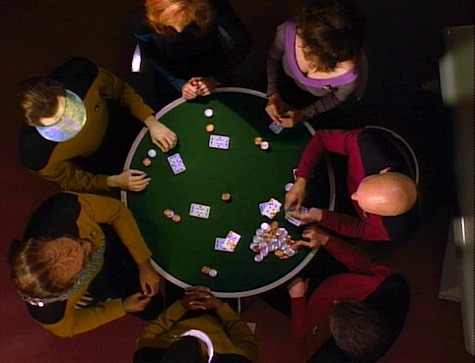
Can’t We Just Reverse the Polarity?: Anti-time can be created by tachyon pulses being fired into things. Or, y’know, something.
Thank You, Counselor Obvious: In the past, Troi—back to the miniskirt she wore in “Encounter at Farpoint”—expresses concern over the crazy-ass orders Picard is giving, complicated by Picard’s rather peculiar refusal to take the past crew into his confidence. He claims it’s to avoid polluting the timelines, but those are pretty well filthy from the moment he shows up on the shuttle with Yar. No I think it’s more than these people don’t know him or trust him yet, which Troi points out to him more than once.
In the future, Troi died some five years after when the present part takes place, which saves Marina Sirtis from having to be dipped in latex or have gray added to her hair, or both. To be fair, she already went through that nonsense in “Man of the People.”
There is No Honor in Being Pummeled: In the future, Worf leaves Starfleet and eventually ascends to the High Council—but later descends to a planetary governorship with very little standing in the empire, which has gone ahead and conquered the Romulans.
In the past, Worf has the shorter hair and cloth sash he wore in the first season, but his makeup is the same as it is in the present and future rather than the less refined crest he had in season one.
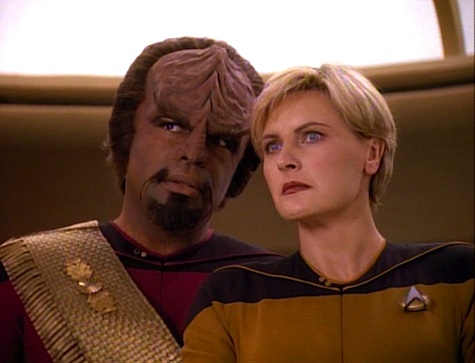
If I Only Had a Brain…: In the future, Data is the Lucasian Chair at Cambridge. He lives in the traditional residence for the chair, going back to when Sir Isaac Newton held the post, with a cranky housekeeper and a mess of cats. He’s also put a streak of gray in his hair to make himself look more distinguished (though I’m with the housekeeper: it makes him look like a skunk), and in the intervening 25 years, he’s mastered contractions. When he declaims on how the anomaly might have been formed in Ten-Forward, he paces and gestures as if he’s lecturing a bunch of undergrads.
In the past, Data inexplicably has a junior-grade lieutenant’s pips, and he struggles with idioms and slang and also babbles a blue streak. It’s kinda fun to see that again.
No Sex, Please, We’re Starfleet: Troi and Worf’s relationship is proceeding apace, though Worf appears not to have gotten any further in consulting Riker on how he feels about it since his pathetic attempt in “Eye of the Beholder.” Riker’s disapproval will keep the relationship from developing in the future segments, leading to a rift between the two friends that will last two and a half decades.
Picard and Crusher share a kiss in the captain’s ready room. In the future we see that they’ve been married and divorced in the intervening 25 years.
Future-La Forge is married to a woman named Leah, now the head of the Daystrom Institute. It’s strongly implied that this is Leah Brahms, which is SO INCREDIBLY CREEPY….
What Happens On the Holodeck Stays on the Holodeck: Worf takes Troi to the Black Sea for a romantic barefoot walk on the beach, which Worf describes as “stimulating.” Troi takes him to task for his lack of poetry, and pushes him to be more eloquent in describing it. Worf accedes to this request by saying that it was “very stimulating.” Such a gooshy romantic, is he.
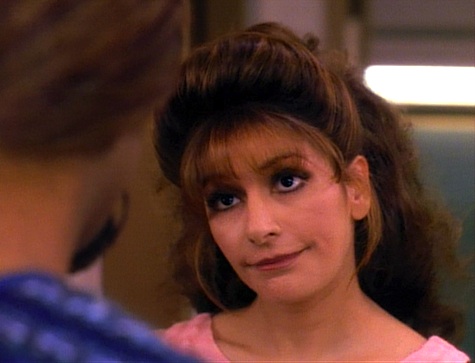
In the Driver’s Seat: In the past, O’Brien takes the conn; he was first seen as a relief conn officer in “Encounter at Farpoint.” In the present, Ensign Gates flies the Enterprise one final time, while the Pasteur’s conn officer is Ensign Chilton, who’s killed during the firefight with the Klingons.
I Believe I Said That: “You have always used your knowledge of Klingon honor and tradition to get what you want from me.”
“Because it always works, Worf!”
Worf and Picard in the future summing up their relationship.
Welcome Aboard: The main guests are all folks we’ve seen before for one final roundup. For the past segment, Denise Crosby returns as Yar, and Colm Meaney takes a break from Deep Space Nine to serve as O’Brien again. In the present, Patti Yasutake is back as Ogawa, Clyde Kusatsu reappears as Nakamura, and Andreas Katsulas appears for the first time since the fourth season’s “Future Imperfect” as Tomalak. And of course, John deLancie brings things full circle, reappearing as Q.
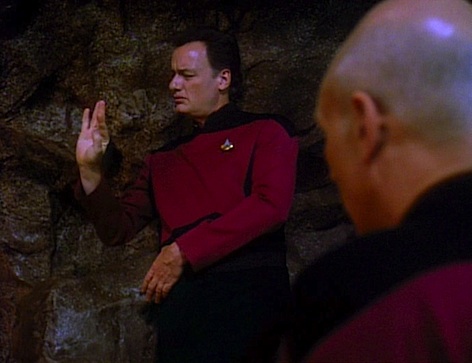
In addition, Pamela Kosh is delightfully harumphy as Data’s housekeeper Jessel, while Tim Kelleher, Alison Brooks, and Stephen Matthew Garvin fill out assorted future Starfleet officer roles.
Trivial Matters: This episode was adapted not only into novel form (just like “Encounter at Farpoint,” “Unification,” “Relics,” and “Descent”), but also comic book form. Michael Jan Friedman wrote both, with the art for the latter provided by Jay Scott Pike & Jose Marzan Jr. The novelization included several additional characters, among them Wes, the Traveler, Guinan, Sam Lavelle (as Admiral Riker’s aide in the future segment), Pulaski, and Ben.
Picard’s orders to take command of the Enterprise were written by Admiral Norah Satie from “The Drumhead.”
Nobody noticed the mistake that present-Data discovered three identical tachyon pulses, even though one was from the Pasteur and should’ve been different. It was first noticed when the episode aired—by executive producer Rick Berman’s ten-year-old son. Oops.
Besides going back to the unitard uniforms, several other set changes were made to the past segments to achieve the look of the first season, including restoring some (but not all) of the bridge set design, most notably the more reclined conn and ops chairs.
Both the Pasteur and Enterprise in the future go as fast as warp 13. This contradicts what was later established in Voyager’s“Threshold,” that warp 10 is unachievable, though it does track with higher warp speeds seen on the original series’ “By Any Other Name.”
The images of past-Riker that Picard spoke to alerting him to their delay in arrival at Farpoint Station was taken from “The Arsenal of Freedom,” thus saving Jonathan Frakes having to shave. (You can see the image of Captain Paul Rice from that episode standing behind him in one shot.)
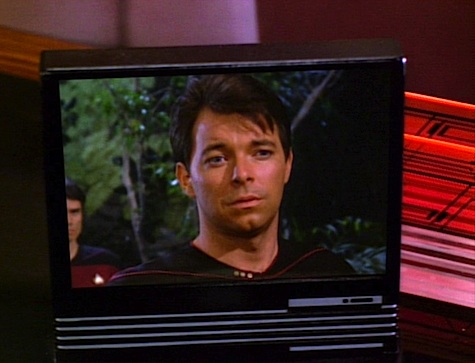
The future-Enterprise has a cloaking device. Since the Klingons conquered the Romulans in that future, the treaty with the Romulans—established in “The Pegasus” as being the reason why Federation ships don’t have cloaks—is no longer in effect.
Future-La Forge has replaced his VISOR with what appear to be bionic implants, similar to the ones the character will wear from the movie Star Trek: First Contact forward.
Worf and Troi’s relationship is never again seen on screen. When he moves to the cast of Deep Space Nine, Worf eventually starts up a relationship with Jadzia Dax, finally marrying her in the sixth season, while Troi and Riker become a couple again in Star Trek Insurrection (amusingly, at one point in the film, Worf gives them his blessing) and they get married in Star Trek Nemesis. The novel Triangle: Imzadi II by Peter David chronicles the rise and fall of the Worf/Troi relationship in the period between Star Trek Generations and Star Trek: First Contact. (Speaking of David, there are some structural similarities between this episode and his novel Imzadi, with three time tracks, and a future where Troi is dead and Riker is an embittered old admiral.)
The Devron system is seen again in the novel Serpents Among the Ruins by David R. George III and the video game Away Team. The planet H’atoria plays a role in the plot of your humble rewatcher’s A Singular Destiny.
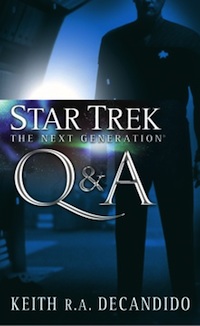
The events of this episode play a large role in your humble rewatcher’s Q & A, which reveals Q’s ultimate purpose in his constant meddling with the Enterprise in general and Picard in particular. Picard’s experiences in this episode serve him well during the climax of that novel.
This episode won the 1995 Hugo Award for Best Dramatic Presentation, TNG’s second win in that category, having got it in 1993 for “The Inner Light.”
Ronald D. Moore & Brannon Braga wrote this script simultaneously with that of Star Trek Generations, filming of which began while this episode was being shot (the Enterprise-B prologue was lensed while “AGT” was being done). Moore & Braga wasted no time in trashing the future seen in this episode by destroying the Enterprise in the movie.
Damon Lindelof, one of the producers of the current Star Trek film series, cited this episode as the inspiration for the Lost episode “The Constant.”
When choosing a title for the 20th anniversary TNG short story anthology, editor Marco Palmieri went with The Sky’s the Limit, after the final line of the series. (Your humble rewatcher has a story in that one, “Four Lights,” a sequel to “Chain of Command Part II.”)
Make it So: “It’s time to put an end to your trek through the stars.” Star Trek’s track record with endings is notably poor. The original series’ “Turnabout Intruder” was a misogynistic disaster even by the low standards of the third season, while even the animated series’ most fervent fans (myself included) are unlikely to use “The Counter-Clock Incident” as an example of why Filmation’s efforts deserve to be counted alongside the live-action ones from Desilu.* As for the spinoffs, Deep Space Nine’s “What You Leave Behind” was a noble failure,** Voyager’s “Endgame” was an ignoble failure, and Enterprise’s “These are the Voyages…” was an embarrassment.
But man, did they get it right here.
“All Good Things…” is the perfect ending to TNG, bringing the show full circle from “Encounter at Farpoint,” giving everybody a moment in the sun, showcasing the amazing talents of the ensemble in general and Sir Patrick Stewart and Brent Spiner in particular, showcasing a Roddenberrian view of humanity—being capable of greatness—while drowning us in just enough technobabble with warp fields and anomalies and time travel and other nonsense. Plus, we get TNG’s best antagonist in John deLancie’s Q.
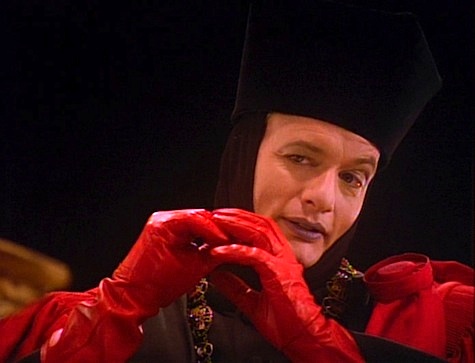
Moore and Braga are aware not only of what makes TNG work, but also what’s wrong with it, and they don’t miss an opportunity to make fun of some of the show’s excesses. Most of those come from Q, particularly when he snarks off Picard for how much time he wasted the past seven years on mundane concerns like Riker’s career, Troi’s psychobabble, and Data’s endless quest to be more human, but others get their shots. After Data lets loose with a stream of technobabble, Crusher speaks for an entire viewership when she exasperatedly says, “English, Data,” and future-La Forge’s greeting to Picard is epic: “Captain, we’ve got a problem with the warp core or the phase inducers or some other damn thing.”
The entire cast shines in this one. LeVar Burton gives one of his best performances as the middle-aged, family-man novelist La Forge. (On the other hand, not nearly enough is done with his acquiring sight for only the second time in his life, the other being “Hide and Q.” That notion will be better used in, of all places, Star Trek Insurrection.) Michael Dorn is embittered and miserable as Governor Worf, Jonathan Frakes is cranky and crotchety as Admiral Riker, and Gates McFadden shows a Captain Beverly Picard who has gotten steelier with age, divorce, and a ship command. Denise Crosby’s guest turn is less intrusive here than it was in “Yesterday’s Enterprise” or either of her appearances as Sela because the first-season setting makes her feel like a natural part of the process, alongside Worf’s sash, Data’s babbling, and the unitards. And making use of Colm Meaney’s “Encounter at Farpoint” cameo to bring O’Brien back to the TNG for a last hurrah is a really nice touch, as is Picard making use of his knowledge of O’Brien’s future as Deep Space 9’s miracle worker. Andreas Katsulas is magnificent in his one scene as Tomalak, and deLancie is his absolute snottiest here, his banter with Stewart as sparkling as ever. As a last hurrah for TNG’s finest double-act, this is a bravura performance.
Speaking of whom, what makes this episode sing are the performances of Stewart and Spiner. A goodly chunk of TNG’s success was on the back of these two, and this final episode showcases them superbly. Stewart’s portrayal of the elder Picard is astonishing. As the oldest person in the cast, he’s lost the most in the 25 years that they’ve jumped ahead, and his struggles with space Alzheimer’s are heartbreaking. But you also see the drive and strength that lead everyone to go along with his crazy-ass notions, simply because he earned it after three decades.
And that’s as nothing to the trifecta of awesome Spiner pulls off, giving us three distinct Datas who are all very obviously still Data, but at varying stages of development. Spiner magnificently channels his first-season persona, with the babbling, the inquisitiveness, the cluelessness. (He’s aided and abetted in his first past scene by Colm Meaney as his straight man, standing there like a deer in the headlights while Data asks for the etymology of the phrase “burning the midnight oil.”) Meanwhile, future-Data is more relaxed, uses contractions, employs less stilted gestures, and smiles more naturally. (He also has a lovely line where he says he keeps Jessel around because she makes him laugh.)
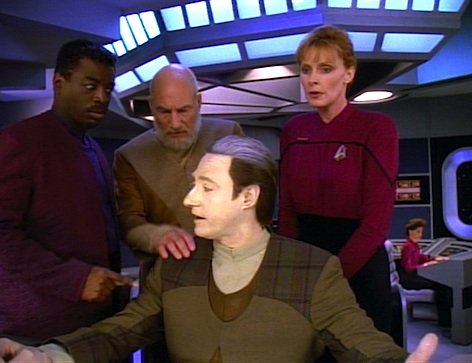
In the end, the human race is (of course) saved, everyone’s back in place, and we end with one of TNG’s signature tropes, the poker game, with Picard finally being dealt in.
Sure the technobabble is mostly nonsense, the test is patently ridiculous and doesn’t really prove much of anything, but who cares? It’s the perfect ending to the show, and that’s what matters.
* True, it did have the coolness factor of showing us Robert April, but it was still the turn-the-crew-into-little-kids plot. That trick never works.
** It had its moments, but they mistook the end of the war for the end of the show, and wasted a lot of time with Sisko-Dukat nonsense when they should’ve concluded the show with Bajor entering the Federation, which was Sisko’s mission as stated to him by Picard in “Emissary.”
Warp factor rating: 9
Keith R.A. DeCandido’s plan to take over the Internet continues apace, as he now also writes about the New York Yankees for the Pinstriped Bible. Look for his baseball rantings at that site every Monday.










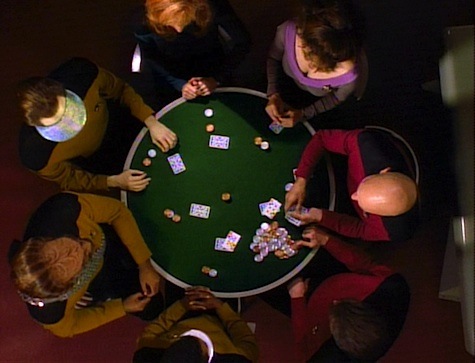
I remember two dates clearly – watching the premiere with Encounter at Farpoint and then watching AGT. I recall the amazement at the Future Enterprise battle taking place on ALL THREE AXES instead of on the same plane.
So many emotions with this, but at least DS9 was already rolling, so the sting was lessened a bit. (And we’ll have to agree to disagree about “What You Leave Behind…”, but that’s a discussion for 2015 or 16 :) )
And this is just another example why Ronald D Moore is one of the greatest science fiction TV writer/producers. Yeah, he’s had a few clunkers, but the vast majority of his stuff is intelligent and challenging, yet still honors the fans of the show.
It really was a beautiful send-off. As I read this review, I listened to the soundtrack suite taken from the episode, in which Dennis McCarthy reprised themes he used for Q in “Encounter at Farpoint.” That sums up the bookend feel of the episode pretty well.
It was great to see Tomalak again, but he was not good by Katsulas’ high standard, and he certainly wasn’t “magnificent”. The Tomalak from season 3 was calm and quietly menacing. This one screamed at Picard, and we never saw that from him before. In fact did we see any Romulan yelling in the run of this show?
*sniffle*
I’m glad I’m not the only one that thinks the ‘test’ doesn’t really make sense (I’m not sure exactly what it was testing that hasn’t already been demonstrated before) but I love the episode anyway.
I’m just sad it’s all over now (well, I know we get a Season 7 overview, and maybe a series overview??)…I have enjoyed the rewatch so very very much :) My husband and I have really enjoyed discussing them too!
I think I might have to check out Q&A – I am not going to let myself get sucked into a completest mindset for Star Trek books like I have with Star Wars EU – ain’t nobody got time for that – but every time you mention that one I want to read it. Maybe I’ll even buy it new so you actually get a royalty for it ;) (I buy almost all of my books secondhand for both monetary and environmental reasons, but it always makes me a little sad that that really doesn’t benefit the authors very much).
And who knows, maybe we’ll end up on the DS9 re-watch, but we have to get the DVDs first :)
I thought they aged Gates really well, and I loved that no mention was made of Geordie’s bionic eyes, as it really should have been old news for everyone involved.
I did wonder why Picard was so intent on not polluting the timeline, once he determined that no one from the “Present” rememebered that first mission any differently.
And Lisamarie, if you don’t want to lay out the money for the DVD’s, Netflix streaming has all 6 series available for a small monthly fee.
Anyone else remember watching the vote-for-your-favorite-episode marathon leading up to this?
The perfect final episode, honoring the series past while giving us a beautiful glimpse of the future. It hardly matters that the time travel plot has some major holes, or that Q’s test hardly makes sense(thinking about it now, I wonder: Why didn’t Q just make Picard play Portal?).
It’s a brilliantly clever script. Details like past-Riker being marooned on Farpoint to avoid messing with The Beard show how much care went into it. But that cleverness is matched by a perfect sense and tastefulness of how the show works and how it should end, and that’s where Enterprise’s finale went wrong.
“…future-La Forge’s greeting to Picard is epic: ‘Captain, we’ve got a problem with the warp core or the phase inducers or some other damn thing.'” Love it. (Quoting not working on device)
Epic, that’s the word. Great review of what made this so great. Left unmentioned was the dynamic of going back to the beginning as a “if I could do it again…” Show-as-life. But so many angles in this, in the rematches it reall stands out as not just the perfect finale, but one of the best two hours in all of trek.
This rewatch has been absolutely, thoroughly enjoyable. Back for DS9? And don’t mention the TNG movies, I prefer to live in the Worfian “Parallels” universe where All Good Things… (worthy of the italics) was the Next Generation curtain call.
I agree this was a great ending, though it made me sad that it ended when I was watching it. My dad, brother and I would always make sure we were home Saturday night at 7 to watch this through all 7 years. My dad even went so far as to mathmatically figure out how fast all the warp speeds would have been. This was before the internet( or at least before we had it) so I was pretty impressed with him figuring that. we watched the first couple of years of DS9 but it wasn’t the same. Never watched more than a few episodes of Voyager
First, congratulations on completing the TNG Rewatch. It’s been a fun journey.
Good rundown of the episode. Thanks for mentioning the 3 Enterprise/2 Enterprise+Pasteur error. That’s bugged me for almost 20 years, wondering if it was a mistake or if I missed something, so I’m glad to see others know about it.
Now, for my complaint, and one I’ve had for a while but it’s only appropriate to bring up here? What’s your deal with LaForge?
“Future-La Forge is married to a woman named Leah, now the head of the Daystrom Institute. It’s strongly implied that this is Leah Brahms, which is SO INCREDIBLY CREEPY….”
Why is it creepy? I get you don’t like “Booby Trap” but you ignore that LaForge does nothing inappropriate in the episode. When the computer generated Leah tries to give him a neck rub, he shoos her off, and at the end, after a chaste kiss, he shuts down the program for good. The episode doesn’t imply anything else happens. At worst you can accuse him of the equivalent of falling for an author based on their writings and biography. And in “Galaxy’s Child” , he again is not inappropriate. He’s again, attracted to someone, and the most powerful computer in the world has said “Hey, she’s going to be in to you.”, so other than getting his hopes up (and being awkward), what’s he done wrong? And as the episode leaves with them being friends, then them being married in the future isn’t a problem, unless every story with 2 friends becoming a couple after one is divorced or widowed is “so incredibly creepy”.
Interestingly, you give Barkley a pass for creating a Troi sex hologram, which “Hollow Pursuits” all but shows on screen.
Don’t get me wrong, “Hollow Pursuits” is a far better episode than either of the LaForge ones, but you (and other commenters) hit LaForge for things that didn’t happen and aren’t supported by the text.
Well, onto Bajor and the Wormhole!
This is a love-it-or-hate-it episode. I’m firmly in the ‘love it’ camp:
“Meanwhile, future-Data is more relaxed, uses contractions, employs less stilted gestures, and smiles more naturally. (He also has a lovely line where he says he keeps Jessel around because she makes him laugh.)”
And still, it is so crazy to imagine Data laughing that I figure he must have perfected the art of lying.
I love, love, love, love, love this episode. I especially loved Q’s line about “charting the unknown possibilities of existence,” which is what Star Trek is about at its best, and I wish the movies had followed up with that (though to be fair, I think some of them tried and just failed).
The other thing about this episode is that it retroactively redeemed Encounter at Farpoint. I always liked Encounter better than most other Trekkies I knew, and it wasn’t until recently that I figured out why: it’s because I saw this episode first. When it aired, Encounter at Farpoint was just another episode about an all-powerful Space Jerk putting the crew of the Enterprise on trial, something that was done a million times on the original series. By making the trial a metaphor for everything that the crew has done, all the trials they face in their explorations, that made it into something worth paying attention to. “The trial never ends” indeed.
Don’t mean to be quite such a fan girl, but I really do like this episode. I feel even if nothing else Trek had ever been made, this would still be worth watching.
There are those among us who believe Moore and Braga should have made “Generations” a TV entry and saved “…All Good Things” for the theater. Still, like the”Inner Light”, this is one of my favorites, a fine bookend to the series. It wrap things up without ending them, implying much more to come, but making the show a stand-alone; no requisite for the films would be needed, and should’ve ended right there.
In a way, I think that Roddenberry conjured up the film series as an apology for ending the original series so badly. Granted, it wasn’t his fault the network killed it, but as you mentioned, “Intruder” was so dismal. “…All Good Things” saved TNG from all that. With the exception of “First Contact”, none of the Next Gen movies were worth it.
Maybe execept for Worf’s hangover.
I love, love, love this episode, for all the reasons you mention. Best television series finale ever, maybe?
You mentioned the end of the other Treks, & LOST, & that made me think about…other show endings. Twin Peaks! BSG! Let’s rumble!
Yay tNG!
It really has been a fun trip down memory lane to read these reviews. Thanks for the work and patience, KRAD.
I don’t rate this finale as highly as you do, Keith. Sure, as a nostalgic send-off for a television show and its cast, it works pretty well. But as a science fiction story, or even as a work of drama by its own internal standards, it’s just a bunch of hollow nonsense. There’s no great lesson in probing the mysteries of existence here, just an overly convoluted Braga-esque technobabble puzzle that doesn’t make a lick of sense. It doesn’t have any message, any statement to make beyond “Hey, this was a cool show, wasn’t it?” Which I suppose is fine if you’re doing a series finale, but don’t pretend it’s some profound cosmic life lesson, okay?
As far as the timeline issue goes, I think it’s pretty clear that the past segments are either an alternate timeline to begin with or just a Q illusion. Even aside from the fact that events in that past have no effect on the present, there are several notable differences from what prior canon established. Picard doesn’t seem to have met Tasha before the shuttle ride to the Enterprise, whereas “Legacy” established that he chose her for his crew after seeing her in action. Tasha has a different hairstyle. O’Brien is main-bridge conn instead of battle-bridge conn as he was in “Farpoint.” And Picard officially takes command on stardate 41148 whereas “The Drumhead” said it occurred on stardate 41124.
In the epilogue of my TNG-prequel novel The Buried Age, I portray what I assume to be the “original” version of the events seen here, drawing on the “All Good Things…” past scenes but modifying them to fit what was established about the main timeline.
As for the inconsistency with the “identical” tachyon pulses, I’ve sometimes speculated that maybe the Pasteur inherited the E-D’s old tachyon emitter when it was upgraded with a new one. Or maybe it was just part of the illusory scenario Q created. A lot of the nonsense in this episode is more palatable if you assume Q just faked the whole thing. (If the anti-time anomaly extended into the past, why didn’t the Pasteur crew see it already there before they created it? And what the frinx, pardon my Ferengi, is “anti-time” supposed to be anyway? It doesn’t make any damn sense. I had the darnedest time trying to come up with a non-stupid explanation for it in DTI: Watching the Clock.)
I’m sure it’s accepted that the future parts are 25 years from the present part…but what is actually said on screen is that it’s been 25 years since they were all last together on the Enterprise. So if they had stayed on the ship for a while, the future parts could be much farther into the future.
I actually liked “Endgame.” But I’m totally with you on all the others.
*sigh* The end.
I think this is a home run. This is head and shoulders above anything else in this dreadful season 7. I think this episode is even better than when it first aired because now we know that this really was it for good Star Trek.
First Contact was a really cool monster movie, but it wasn;t very good star trek. Gene would have absolutely loved this episode. I still cry every time Picard says “I really should have done this long ago”.
While I remember enjoying the finale for all the reasons you mention, I also recall my little Picard/Crusher shipper heart getting incensed at the divorce in the ‘future’ segment. Almost twenty years later and I remember my “nope nope nope” reaction. hee.
Thanks for the rewatch – I haven’t commented much, but I’ve enjoyed reading along and remembering when I used to be able to name an episode by its opening scene, but have since forgotten quite a lot. Looking forward to DS9, which I stopped watching about halfway through. I didn’t really drop it, so much as drift away (mostly, IIRC, for an inability to keep up at a time when the stories were getting ever more serialized), and I should really watch again and finish.
I loved this episode, but it was bitter sweet. The end of something I had truly loved. How do you ever get enough of a good thing? Of course having read this rewatch from the start, I realise now my memories of some episodes have been affected by rose-tinted glasses.
Anyway thank you Keith for all the work you have put into this. every wednesday morning and every saturday night had a moment put aside for a star trek catchup. I have really enjoyed this walk down memory lane. I’m really looking forward to DS9, though it will be a different experience for me. TNG was watched as a child, DS9 as a teenager/college student. Hopefully my memory of DS9 won’t be too far off the mark.
@@@@@ 17, ChristopherLBennett: I’m with you. This is good, but not great. For some reason, everyone rates this episode highly for being a fluffy romp, but it’s not much more than that if you look at it with any scrutiny.
@@@@@20, jlpsap: Along the same lines as above, would Gene really have loved this episode? As Chris said, this episode really isn’t about anything beyond “Hey, this was a cool show.” And if there was ever an advocate for plumbing the depths of meaning on Star Trek, it was Gene. I think he probably would have found this pretty hollow. I mean, let’s be honest, this is basically a popcorn movie.
One of my pet peeves is that the big reveal states that the Devron anomaly was created by the convergence of the 2 Enterprises + Pasteur and then moved backwards in time. But if that’s so, why does Admiral Riker’s Enterprise-D only detect the anomaly for the first time *AFTER* it was created (a.k.a. forward in time)? If it was moving backwards in time from its point of creation, shouldn’t it have been detectable in its infant form by the Pasteur right from the outset? (Of course, the whole episode would then have imploded on itself, so whatever, but still, this annoys the hell out of me.)
But I don’t want to be all Debbie Downer, because episode *is* really fun. The sense of nostalgia runs deep, and this show does get a lot right. It’s just that I have to disagree with KRAD — the better finale is actually DS9’s “What You Leave Behind,” because that episode really felt like it was *about* something deeper than merely giving the crew a final adventure. DS9’s finale wasn’t perfect either, but it had a better story and (more importantly) it showed us that our characters’ actions had consequences, some which would be very hard to live with. It wasn’t all pink unicorms and rainbows.
I remember seeing this episode when it originally aired almost 20 years ago and I don’t fall into the “love it” or “hate it” camps.
I thought it was lukewarm then and I think it was lukewarm now.
I agree with Keith that the acting in it was very good and that the nuanced differences in the characters between timelines were really well done.
The reason why is because it seemed incredibly anticlimactic. It was merely another time-travel story like “Time’s Arrow” in which the characters learn more about themselves by travelling in time, which seemed like a cliché after 7 years. The events in this episode seemed to have little or no relevance and impact to the Trek universe as a whole in so far as much as what was going on in DS9 or what was about to happen in Voyager the following year.
I was really anticipating a more climactic ending in which the characters of this series sort of ‘passed the torch’ (cliché intentional) to a conflict or a story line in the following series. I think a traumatic and nearly deadly introduction to the Dominion or a huge conflict with the Borg would have been a much more exciting send-off to this series than a bland time-travel story.
Those would have been stories that could have been continued and further expanded upon by the crews of DS9 and Voyager.
In fact, one of my biggest issues with these series is that there was so little crossover between characters (besides Worf and O’Brien) that it almost seemed like events in one series had very little bearing on events in the others. With Voyager, it’s more understandable because the ship was stranded in a different part of the galaxy, but I thought it would have been nice to have ended this series with a crossover to DS9 episode.
@23,
I noticed the whole “if it’s really moving backward in time, it should be small when the Pasteur first arrives, then non-existent when the Enterprise arrives later” but I rationalized it as part of Q’s test: the anomoly isn’t moving through time linearly, and while “backwards” is a better description than “forwards,” neither is perfectly accurate.
Thanks, everyone! There’ll be a 7th season overview on Friday, and then the next two weeks will be spent on the four TNG movies, before I kick in with DS9.
Scavenger: The answers to your questions can be found in my writeup of “Galaxy’s Child.” La Forge’s actions in that episode were reprehensible.
—Keith R.A. DeCandido
LaForge probably just stalked her relentlessly, possibly even having a hand in her husband’s death. What’s so creepy about that??
Or maybe Q showed up at some point again offering the crew their greatest wishes, and he again offered LaForge sight, to which Geordi responded “Screw my eyes! MAKE LEAH BRAHMS LOVE ME!!!!”
Orrrrrrr…. 25+ years into the future, it’s now legal to marry a holodeck character. Or it’s not legal, but Geordi did it anyway.
Bravo, mon ami! I don’t know why I waited as long as I did to start reading these, but I’ve positively devoured them over the course of the last three weeks. I even decided to go back and watch some episodes (thank you, Netflix streaming!) based on your high reviews of them, and wow! I had forgotten how good they were. Thank you. I look forward to the writeups of the movies and to your rewatch of DS9. I hope that I may see you again in person some time. Do let me know if you ever make it out to this coast, and I will do my very best to meet come see you.
Keith – thank you so much for your epic work!! It was highly enjoyable.
Was anybody at the Toronto Skydome (with over 30,000 people in the stadium) watching this finale? When the future Enterprise decloaked with its triple nacelles, the roar of the crowd was unbelievable.
@23 (&26) – In fact it does make sense that the Pasteur doesn’t see the anomaly when it arrives. As they have not yet set off the Tachyon beam, it does not yet exist, regardless of which direction in time it is moving. However, what does not make sense is that when the Enterprise-D goes back to the location they find it, as at this point it should be moving backwards in time from a point in the past, and therefore should not be there any more.
That’s a niggle though. I also thought this was “good but not great”. It was fun to see everyone, and I think it hit the right level of people to bring back, such as having Tomalak appear as a kind of representative of “all past adversaries” (it could have got silly if they had tried to fit too many in).
(One more niggle. Data looked more like a badger than a skunk!)
@31. Okay. Maybe. But if your explanation holds (that the anomaly didn’t exist until after it was created), then why is the anomaly visible in the other two time periods, *in the past*?
Like you said, though, it’s a niggle. Because otherwise I think we’re relatively on the same page regarding the overall effect of the episode.
@17, ChristopherLBennett, also @23, Gilbetron. @17:
This is on-target. But then:
Look closer, at the relationship of a TV series to life. They started at a certain point, had seven years and 170-something episodes, some they made the effort and it paid off, some they phoned it in, some they had constraints they couldn’t work around, other times they missed opportunities. Now it’s over and done. The metaphor couldn’t be clearer than Picard being at the end of his life. And the past can’t be changed. Except this is a TV show, and with Q they can. Also, TV shows end (some people argue that’s why they are enjoyable) but life goes on, and we’re not going to see these people day-to-day anymore, if they would real they would go on to have full lives as we see in the 25-years-on segment, but we just got this one seven-year window into their lives. The meaning was there. Forget who fired what tachyon pulse or whatever damn thing. Just beautifully rich focus on characters, not just by the standards of the show but by the standards of anything.
Actually, it would be remiss to mention my one hair-pulling objection to this episode, which is that Picard got Captain Beverly’s ship blown up, which is a mandatory court-marshal, which probably isn’t going to go well because she was doing something extremely risky as a favor for her ex-husband. But in the next scene she’s just sipping a drink like nothing happened.
@@.-@. Lisamarie:
Hulu currently has the first season of DS9 available for free.
@32 – Hard to explain, but it makes sense in my head. The way I see it, the past, present and future are three entirely separate timelines (which is why events in one cannot be recalled in the others.) The only thing linking them together is Picard travelling between them. In the past and present timelines the anomaly exists because it has already been created, albeit in the future. In the future timeline, the anomaly is only a potential until the moment at which the Pasteur sends the tachyon beam, as that is what creates it. The tachyon beam scans beyond the subspace barrier therefore it isn’t a huge leap in logic (or at least no bigger than that leap itself) to assume that it can scan beyond a single timeline into “all possible timelines”.
I’m with Chris on this one. The technobabble mucking up the time continuum didn’t work for me, but at least it wasn’t Voyager -_-. Wake me when we get there! I was sad when the show went off, but we had DS9 already in full swing. For finales, I thought DS9’s was much better in the execution. I’ll read your thoughts about the movies, but I’m chomping at the bit for DS9. Bring on the Bajorans!
Keith, you made it buddy! Good work, and I must say this has been a highlight of my internet life for awhile now. I await your DS9 re-watch with anticipation.
As for the episode, I am overcome by waves of nostalgia concerning it as I was 11 when it aired, and ANYTHING Trek was the paragon of entertainment for me. I remember being entranced by the finale and hanging on its every moment, and even crying at the end when Picard is content playing poker with the rest of his crew, his friends.
Yeah, in the end it doesn’t quite pass muster as a fully realized endeavor that is a bit fraught with bad science (yet nowhere near as bad science as we have seen from prior episodes, or will see from VOY), the script is tightly acted, and the showrunners try to do their best to get everyone together for one last hurrah. As for certain continuity errors, it is to be expected, but for all our assumptions (e.g. O’Brien is the Battle Bridge Conn Officer and ONLY the Battle Bridge Conn Officer) it was nice to have that inclusion and see the rapport that all the actors, even those that had been away from the series for a long time, were able to have with the script. Worf talking to Yar as if they had been working together for years, Data and O’Brien debating the finer points of maddening euphemisms: it still was great entertainment. And yeah, we may come back to it years later and when our nostalgia wears off see those flaws, but for what it was, it was an excellent send off.
In an era when TV Shows end and they get absolutely abysmal endings (BSG’s “it was all in the past” ending, Enterprise’s “Holodeck Simulation”, Doctor Who’s “The next doctor is Matt Smith”, etc.) it was great to see that something like TNG which refreshed the fan base, and kept Trek relevant for almost another decade, went out like a champ. With a bang, not a whimper: that’s why this episode is great.
I’d also make an argument that DS9’s “What You Leave Behind” is even better than this episode in terms of catharsis and epic scope. Sure it didn’t end with Bajor being inducted into the Federation, but it got there eventually in the 8th season from Pocket Books.
Bravo! Onto DS9!
I think it’s fairer to consider “Terra Prime” the series finale of Enterprise, and “These Are the Voyages” as a franchise finale for all Modern trek. Both episodes are considerably more successful viewed in that light, although TAtV is never going to be great in any context.
I really liked this episode but the thing I didn’t understand was Q claiming it was the Continuum that ordered the test, but it was Q’s idea to send him through time, and Picard thanked him. However, if Q never sent him through time, the anomaly would never have formed in the first place. Does Q mean that he decided the parameters of the test and Picard thanked him because of the new perspectives it gave him? Or was he thanking him for sending him through time because it helped him solve the anomaly?
On the Moore/Braga commentary track for Star Trek: Generations the writers talk at length about how much effort and time went into the script for that movie and how rushed they were on the teleplay for “All Good Things” and how, in the end, they decided that “All Good Things” was much better.
…. and scene.
Yay!
Thanks for the entire project, Keith. It was really very entertaining and enjoyable and will throw you particular props, snaps and kudos for responding to comments and engaging your readers.
I will always love future Data, remain aghast, lo these twenty-some-odd years later, at the notion of Leah Brahm’s marrying her cyber-stalker(you know what I mean) – I mean, I was less creeped out when Laura married her rapist Luke on General Hospital, for peetsakes, and I always grooved to the idea that Beverly gets command her own medical vessel (then again, wasn’t she shunted off to head Starfleet Medical during her second season absence? What an oddly twisting career she’s had). I loved the whole Shakespearean ups and downs of Worf’s post Starfleet political career and I love the fact that the Klingons conquered and absorbed the Romulan Empire, when I always got the feeling that it was the Klingons who were in retrenchment and the Romulans ascendant.
I will also nod approvingly at the future uniforms sported by Beverly and the Pasteur’s crew which looked somewhat cheaper (budget concerns, no doubt) but still conveyed a trim, spartan military aesthetic and was a nice continuation of the TNG ones. I will quibble that Beverly was wearing command red and not sciences blue, though.
Lastly I will commend to your attention that the design of the Pasteur, a large globe, instead of a saucer, affixed to the base with nacelles model, is a definite allusion to an earlier, original concept design for the TOS Enterprise. I would include a linked reference but then Tor-bot blocks the post as spam.
Bravo, Keith. Looking forward to DS9 next!
Having viewed all of the TNG episodes in the last few months, I realize that the captain that I would most want to work for in Trek is…Crusher.
For the longest time it had been Picard, and then more recently, Pike (Greenwood version). But having re-watched Crusher as captain recently in Descent and here in the finale, she would be my choice. She has a calm, non-stressful and respectful style on the bridge. And she’s very supportive of the junior officers.
Thanks for all the hard work and great summaries, Keith. I really enjoyed it, and I’m looking forward to more.
Keith it’s an impressive two years of work and it’s been a blast to read your opinions and summaries as well as those of all the posters. Thanks for everything and like many here I’m looking forward to revisiting DS9 with you.
Great Job Keith this has been fun and I’m looking forward to the movies and DS9 rewatches too.
I’m always torn by this episode it’s great that it goes full circle and the gangs all here including Yar and Q but I hate time travel episodes they give me a headache. Q’s test makes no sense at all because how exactly did going through all this timey whimey stuff save humanity? I liked the future bits with Geordi, Data and Crusher. It always drove me crazy that they never explained how Troi DIED! The best part was the end when Picard joined the poker game and it ended on a happy note. This episode will always have a special place in my heart because it aired the night of my college graduation. The champaign is gone the house is quiet, and I sat alone in the living room at 2 a. m. to wired to sleep; watching the end of something that I loved getting ready to start on a new voyage of my own.
This episode was a pleasant bookend to Farpoint but I’m so glad movies followed and spin off shows conltinued. Having gone through all of this makes it clear to me that while I enjoy reboots I do not crave them. The writers and actors created characters that I would like see develop more because I care about what happens to them.
I still think this is one of the greatest television series finales of all time. The beauty of an episode like this is that I am completely aware of all the nitpicks people have mentioned, but it doesn’t matter.
Encapsulating all of the feelings and personal attachment one has for the show is far more important, which is why I can wave off the anti-time stuff here but can’t forgive something like the lack of Jadzia footage in the “What You Leave Behind” montages. (Yes, I know why that happened, but it’s one of the reasons I’ll never care much for that finale.)
The test always made sense to me: Can humanity think outside the box? Can Picard function the way Q does? Moving between time periods and acting in them “simultaneously” is the only way to both deduce and solve the episode’s crisis; Picard’s ability to do this, while also accepting the paradox that he is the cause of it, is the proof that humanity might just be able to operate on that next level.
I also think Keith is overstating the case with La Forge (who I also thought was more awkward than creepy), but it’s been a while since I’ve watched “Galaxy’s Child.”
On a further note I think this Trek ending isn’t so profound but self centered. The original series didn’t get a proper ending. Voyager and DS9 did get proper endings. Enterprises ending was more a Next Gen episode than a Enterprise episode and it served to resolve a problem for Riker and Troi than it did for the Enterprise crew. But of all the endings I think the ending in DS9 has the most value for meaning and is truest to Star Trek’s vehicle for social discussion. What do you guys think?
But how is that “next-level” thinking? It’s frankly a very easy puzzle to solve. Particularly with Q making it blindingly obvious by making Picard’s awareness jump between timeframes so that he is experiencing them almost simultaneously. That’s just what I find so lame about it. It’s presented as this profound insight that requires some great leap of consciousness to grasp, but it’s so damn obvious and simplistic. Anyone who’s studied relativity has encountered more difficult challenges to our assumptions of causality, so this should’ve been elementary to the captain of a science vessel that travels faster than light, particularly a captain that already has so much firsthand experience with time travel.
I love this episode with unabashed affection. I get emotional just thinking about it. A great moment for TNG.
My main take from this rewatch: TNG needed more Dr. Crusher.
This rewatch has been awesome, KRAD. Can’t wait for DS9.
I have to agree that this was the strongest finish of any Trek series, and it did a lot of things well.
I rewatched ‘What You Leave Behind’ recently and I can sum up what was great about it in one word…”Minsk!”
Thanks for all the hard work Keith and I very much look forward to DS9 but I always have and always will detest this episode. Chris @50 sets the main problem with this episode up but I also had major problems with several other aspects of it. Since I could never get past the setup and actually thought the Q part of it was mailed in by deLancie the episode really irked me. Ugh 3 at best because the main cast was pretty good with what they were presented which will always be hot garbage in my mind.
Couldn’t disagree more. This was an awful episode and probably the worst of an admittedly bad bunch of Star Trek universe finales. They tried to be nostalgic and give everyone a moment in the sun but they failed to tell an interesting story in the process. Not only that, but I was completely uninterested in the futures of all the characters. Sometimes it’s better to just leave that to the imagination. This episode was a disaster on all fronts for me and I prefer to pretend it doesn’t exist.
Did anyone ever play “A Final Unity” for the PC back in the mid 1990s? I thought the story of that game would have also made a good ending.
@@@@@ 55. I played that, but upgraded windows not long after. It didn’t work right under Win98, IIRC. Looked like a good game though.
I dont’ cry. Not a cryer. But something about the circle of life in this episode makes me well up every time. Crusher’s make-up really was amazing. She runs a theatre company in LA and truly… that is EXACTLY what she looks like. Maybe slightly softer, but still. Amazing.
The test everyone keeps talking about – am I wrong here, or wasn’t it them trying to scan the interior of the anomoly to figure out how to close it? And once all 3 beams were converging, THAT was the point where Q really spells it out for Picard in the (alternate, anomoly filled) distant past. And since both ships were Starfleet, couldn’t they use the same frequency for the Pasteur’s beam too? Bottom line, I didn’t have a problem with that.
I always felt a little strange having Worf date Troi. SO MANY TIMES we hear Worf mention how he’d rip a human female apart and so we give him the softest, gentlest human(ish) female? Maybe Troi’s hinted-at sexual appetite makes it work. I dunno. Either way, I’m glad Rike and Troi finally bit the bullet and got back together. They just know each other too well, and have been through too much together at this stage to marry anyone else.
I’m truly sorry I came to this rewatch party so late. I watch the show on Netflix as I’m falling asleep a lot of nights anyway, so I was able to follow along without a hitch. But what fun to have a whole community of people who enjoy this show – one of the best television experiences ever. In a world where most tv sucks badly, I can’t get enough of TNG, even having seen it probably WAY too many times. It just never gets old. When I watch, i feel like “I…can fly anywhere. take a look. Its in a book…” Wait. What I mean is, “See you…OUT THERE”
I wholly agreed with Mr. Bennett above when he said, “There’s no great lesson in probing the mysteries of existence here, just an overly convoluted Braga-esque technobabble puzzle that doesn’t make a lick of sense.” From the very first time I saw this episode, I thought it was a bunch of nice character moments wrapped together with one of the stupidest and illogical central premises that I had ever seen.
Robin M(comment 46): Thats almost as powerful as the last moments of the show. Count your lucky stars… My college memory is Grease. They produced it in college just as we were graduating and thats also about the future and friends. Problem is its a John Travolta musical. Im not going to lie, it hold a spot in my heart anyway.
I really am re-commenting because I neglected to thank you, Keith, for this undertaking. You were knowledgable, insighful, and I often scrolled straight to your review section (just because I know all the shows so well) and you were thoughtful and dead-on pretty much all the time. Just, thanks.
@59: Well, Travolta played the lead in the movie version of Grease, but the role was originated on Broadway by Barry Bostwick six years earlier (and played by others off-Broadway before then, but Wikipedia doesn’t name them), and has been played on stage by dozens of others since then (including Treat Williams, Patrick Swayze, David Hasselhoff, Greg Evigan, Jeff Conaway, and Richard Gere). So it’s not really “a John Travolta musical.”
@50: Can you describe a challenge that would’ve been more difficult and in keeping with that theme–but still easy enough to follow that it would work in the context of a television episode?
@30: “Was anybody at the Toronto Skydome (with over 30,000 people in the stadium) watching this finale?”
*waves*
I was there with my ex-husband and a couple of friends. And, as you said, 30,000 other people (some of whom, no doubt, I’ve since met and become friends with via fandom). Now *that’s* how you watch a Star Trek episode! :)
@62
Glad you were there! It was an incredible, communal experience, when Trek had just entered the peak of its popularity. A privilege to have attended.
@61: If I were being paid for coming up with such a story idea, and if I had time to think about it, I’m sure I could. Heck, Braga himself has come up with more challenging enigmas in other episodes. It wouldn’t exactly be difficult to come up with a puzzle less simplistic and obvious than this one. It’s not as if something happening backwards in time is an unprecedented idea — it’s been part of our culture since the legend of Merlin living backwards, at least. (I’m reminded of all those TV shows and comics and such where the hero is challenged with an “insoluble” riddle and it’s just one of the age-old riddles everyone knows, like the Riddle of the Sphinx or the one about the one guard who always tells the truth and the other guard who always lies.)
JLP @63: You know, I was perfectly willing to let you come back and join the discussion as long as you were willing to respect the rules outlined in the moderation policy–which is why I haven’t been deleting your recent comments. But if you insist on acting like a child, you will continue to be banned, and your comments deleted. It’s as simple as that.
Keith, I am very glad we could end this rewatch with you and I agreeing. This was a great finish to TNG, and I watched in rapt attention at 14 years old when this first aired in 1994, and I watch in rapt attention every time I see “All Good Things…” Im always a bit sad after I watch this, even back in ’94, knowing full well the TNG cast was gonna be in the next movie, DS9 was still airing, and Voyager was coming up the following January. And I still feel a little sad each time after,even knowing full well I can watch it all again. But this was the end of an extraordinary chapter in Trek, one that was never quite duplicated. I loved loved Deep Space Nine and Voyager, and Enterprise, but TNG always has a special place in my heart.
Though I was late to the party, much as I was late in watching TNG during its original run, coming in at Season 5 (to be fair, I was 11 years old at the time) thank you Keith for this rewatch, and it has been fun talking with other Trek-minded folks. Much like its original run, I’m glad I’ll be able to partake in the DS9 rewatch from the top, and look forward to the trivia and insights, and to agreeing and disagreeing (from this rewatch, probably mostly disagreeing, but hey) with your reviews. Agree or not you gave amazing insights and I look forward to DS9.
@30 and 62
Do you guys remember if the crowd had a reaction to Picard’s reveal that the Klingons had conquered the Romulan Empire in the alternate future? I always imagined that an assembled group of Trekkies in Klingon garb would bellow out “Qapla!” at such a moment….
@68: my recollection is that everyone was pretty much watching in rapt attention. I don’t recall any specific reactions to any particular scenes. (Mind you, that was nearly 19 years ago…)
After leaving no opportunity to mention it, it’s clear those Brahms episodes made you REALLY not like La Forge.
After reading the comments, a few quibbles – I have to take issue with those who suggest Crusher is some sort of born captain. Rubbish. In this episode alone, she endangers an entire ship and, but for Ryker’s prescience, everyone would be vaporized. More important, she has the gall to take her ex to task claiming the past Picard never would have stood for the rash insubordination of the older one. Really? Does she not forget that years ago she blatantly ignored the explicit command of her Captain on an away mission, which ultimately led to her ridiculous Stockholm-syndrome love affair with a terrorist, the death of several people, and the near death of her son and destruction of the Enterprise itself? Crusher is a menace. Watch her attitude throughout the series and it’s a wonder she wasnt court martialed several times over…..
I’d imagine you were talking exclusively the TV finales, krad, since I’d think The Undiscovered Country is a worthy sendoff for TOS (even with the reduced role for Sulu). Though I suppose if you went that direction, you’d have to consider Nemesis to be TNG’s and who wants to remember that?
Yes, I was speaking specifically of TV finales. And Sulu’s role isn’t really “reduced” in Star Trek VI, as he actually plays a good-sized supporting role in the film, probably a bigger one in terms of plot importance than the non-big-three characters usually get to play….
—Keith R.A. DeCandido
I just watched AGT for the first time in many years. One could make an argument that it is actually Admiral Riker that is more responsible for the potential destruction of humanity than Picard. Picard was following the most logical course of action given the amount of information available to him at that time by going to the Neutral Zone in all three time periods. In the future, he tries to implore the help of Admiral Riker to take the Enterprise, which is obviously no match for the Klingons. Riker later says that he knew Picard was going to go to the Neutral Zone all along. So if he knew that Picard would find a way to go to the NZ, why would he not intervene until a flimsy medical ship is about to blow up instead of taking him in the first place or at least when the Klingon ships first encounter the Pasteur? Obviously, the writers wrote it that way to give the scene more dramatic effect. But if Riker took Picard on the Enterpirse in the first place or intervened as soon as the Klingon ships apeared, the Pasteur would not have blown up and there would be no anamoly and no threat of humanity never existing. The fault is more with Riker than Picard.
I resisted rewatching this for a while as I thought I wouldn’t enjoy it as much as I remembered, and I was right. Some of the things that annoyed me were… Future Picard is a ‘shouty’ old man. Shout and be obnoxious and you’ll get what you want. I hope when I’m old I’m not as grumpy as this. The destruction of humanity. Isn’t it Q that’s sending Picard backwards and forwards through time? If Picard wasn’t moving back and forth he wouldn’t have been able to create the ‘anti time spatial anomaly’ so none of this would have happened. The trial. Wesley pulled himself out of time – ‘on the first step of a journey that will take him far beyond any human experience’. I’d say that shows some serious evolution as a species. Why the intense focus on Picard and his crew? out of all the billions of humans are these the only ones doing anything of note in humanity’s history? And at the end, we have Picard, Riker, Worf, Crusher, Troi, Data and La Forge at the poker table. Who’s on the bridge and in the Captain’s chair while all the senior officers have a little downtime? And so on. So, best to accept this is a pile of nonsense and just enjoy the spectacle. After the rewatch the one thing that stands out for me is Q’s red leather gloves,. A little threatening, perhaps a little kinky. I must buy some – with gauntlets – for a Q costume.
@75: I won’t quibble with the rest, but the command crew can’t be on duty 24 hours a day. No doubt there’s a night-shift crew that we never see.
I just finished reading the rewatch. Amazing. It has kept a guy stuck in a cubicle enthralled for weeks with all of your amazing comments and Krads excellent synopsizes. I, personally, loved the ending with the exception of “older” Riker’s makeup job. He looked as though he had his head wrapped in a bag of talcum powder and was told to “just shake it around.”
@38: It’s cool to see someone else who was 11 years old when the finale aired. Looking back on it now and how much more I appreciate the show as adult, it’s incredible to me how much I loved it back then. It was definitely a sad moment once the show was done for good. I watched the finale enthralled the whole time.
It made sense that Ronald D. Moore and Brannon Braga wrote a script that connected with “Encounter At Farpoint” which I’m sure was a request from Rick Berman. It is a shame they were tied to a poorly-conceived plot device like the Q Continuum (much like everything else in the first season), but at least by the seventh season, the characters and the writing were so well developed that they could achieve a great sendoff story. I still love it now. The great sense of building urgency in the show and the nostalgic touches throughout make this one of Star Trek’s finest episodes. Bravo!
It’s a minor nit of mine, and maybe not even a true one because I’m not especially fond of the character, but I was thinking how it would be nice if Wesley Crusher (Wil Wheaton) was in some way used in the finale. Obviously he couldn’t be used in the present and was precluded from being used in the past scenes because of the delay to Farpoint, but they could have tried to integrate him into the future scenes. After all, they got back Denise Crosby and even Colm Meaney who was never even a regular!
Also, while it’s already been mentioned how clever it was that the writers didn’t use past Riker so that Jonathan Frakes wouldn’t have to bother with shaving his beard, maybe just as importantly he wouldn’t have to be squeezed back into the 1st/2nd season spandex uniform in which his obvious weight gain would surely be hard to explain! As it is, you can clearly see that even Data has a gut in his past scenes. Lol.
Anyway, lovely episode and the best finale of any of the Trek series. The last scene around the poker table always makes me emotional. We can pretend that’s the true end of our TNG heroes and not the movie version.
Oh, and I also wonder why past Data wasn’t at the Picard taking command ceremony scene and isn’t introduced until the strolling by engineering scene. I’m sure it was done for comedic effect but it is kind of strange that a senior officer and third in the chain of command wasn’t present at the ceremony alongside Troi and Worf.
@79/GarretH: The problem with integrating Wesley into the future scenes was that including someone with Traveler powers would’ve made it too easy for the crew to figure out what was going on and to find a solution, and that would’ve worked against the story. And they’d already wrapped up Wesley’s arc and said goodbye to him with “Journey’s End” a few weeks earlier.
@81/CLB: I do realize that we already got the goodbye to Wesley a few episodes earlier but I thought it would still be a nice full circular sort of thing to have him in some way included in the finale since he was there in the serried premiere, just as Yar and O’Brien were.
And maybe if Wesley were depicted in the future, for reasons he couldn’t figure out, his Traveller powers are negated by Q and he’s just as much in the dark as to what’s going on as everyone else. I’m sure the writers could have gotten creative with it!
@82/GarretH: That’s probably part of the problem — working Wesley into the story would’ve been too much of a digression to set up and justify, and they didn’t have room. As it was, they had to cut out a number of things they considered doing, like a fourth time period set around “The Best of Both Worlds.”
My favourite line in this episode has always been “Mr. Data, you are a clever man, in any time period.” There’s something about the pointed use of the word “man” that always gets me. It’s a very personal compliment from Picard.
As far as the mistakes are concerned, I assume the reason the three tachyon pulses are the same is because Data made the modifications each time and, being Data, would do it the same way. Present Data only speculates that all three pulses came from the Enterprise.
I always assumed that the anomaly was present in the Devron system in the future when the Pasteur arrived, but was small and so they hadn’t had time to find it. When the Enterprise returned, Picard was able to give them a more precise location as, by then, the Enterprise had scanned the centre in the other time periods.
Patrick Stewart plays a superb grumpy old man. He’s particularly good in the two rant scenes, the early one with La Forge and at the end when he’s trying to explain the paradox. I love the way his certainty that he was talking to Beverley in sickbay tales off into “or it might have been a hospital.” And later when he loses his thread over the tachyon pulses and starts babbling about “the chicken and the egg.” He does a great job of sounding like someone who really is struggling to keep his mind together.
I never noticed how good a performance Gates McFadden gives. It’s very subtle, but she really does sound and move like an older person. It helps that she has some of the best aging makeup.
Overall, I love this episode. A nicely character-driven send off for a show that, at it’s best, was very character driven.
Many have commented on how the tachyon pulses that created the anamoly weren’t all the same because the future pulse was from the Pasteur. However, I always figured that because it was actually Data who configured the pulse in all 3 time periods. It doesn’t matter which ship, it was the same android who would have configured it each time.
So, this is it, eh? 7 Seasons of some great, some good, some mediocre and some outright bad episodes. At least they managed to give this show a great ending.
Now I have to make up excuses to my wife why we won’t be watching DS9… I never liked that show and in all honesty, it’s what drove me away from Trek, until Voyager (and even in that I lost interest after season 3 or 4). We’ll see how this works out. >_>
Hannes: I’m on your wife’s side of this one. But then I think DS9 is the strongest of the seven Trek TV series…..
—Keith R.A. DeCandido
I agree with krad. And, how about your wife watches DS9 on her own?
I still have a running joke with my friends about when we watched this episode in ’94. I was the one real Trek fanatic the room and when they brought up anti-time, you could almost hear the sound of a needle being scraped across a record as I said “Anti-time?? … ANTI-TIME??? Are you serious??” We still use that whenever we encounter a ridiculous bit of technobabble somewhere.
TNG will always be my favorite. That is all.
Just rewatched this. One thing stuck out to me that I never noticed before… when Picard is in the present, he has a scene where Dr Crusher scans his brain and realized he had accumulated several days of memories in minutes. So when he flips back to the future and they all think he’s batty, why didn’t he just have them do the same measurements? I’d have thought that would be a pretty good way to prove he’s not just hallucinating the whole thing.
@86 I’m on your side on the DS9 versus TNG debate. I confess I also agree with krad. DS9 is the strongest of the series so far, from beginning to end. It had interesting, multifaceted deeply flawed characters, and some truly intriguing plot lines. That said, I have no interest in ever watching it again. I just don’t like that group of characters. When I said deeply flawed, I mean, deeeeeeply flawed. Kira is a terrorist and risks the life of an unborn child, that isn’t even hers, for the sake of revenge. Odo and Jake both wiped out entire lifetimes of millions of people for their own selfish reasons. And the captain traitorously, murderously starts a war just because he wants there to be one. Bashir openly roots for his friend’s marriage to fail because he wants to bang his hot wife. For the most part, although I was interested enough to sit through the entire series and realized how good it was, I just don’t want to see that bunch of selfish dysfunctional douchebags ever again. And by the way, for such a baseball freak, Sisko throws like a nerd.
In contrast, although they are not a perfect group either, the TNG cast is like family to me. When I turn on the TV and there is an old TNG episode on, I get that warm fuzzy feeling. I’ve even grown to like Troi’s mom, and Wesley. Okay maybe not Wesley, but I’d rather hang with Wesley lecturing me on some esoteric sciency thing then spend 5 minutes with Sisko, especially when he’s in self-righteous mode, when I just want to punch him in that stupid smile of his that he’s always flashing for no particular reason.
Anyway, I realize I’m being gratuitously critical, maybe it’s my blood sugar. I think I’ll go find Inner Light and just relax for 48 minutes with some of the best TV ever made.
I do miss Garak though. In his own way, he was the most genuine of all that bunch.
LOL. I’m just glad somebody else recognizes Bashir for the jerk that he is.
But hey, Rom and Nog are pretty awesome, and if DS9 has anything for it, it’s that it evolved the Ferengi into a species where they are arguably the least flawed of the characters ;)
Quoth fullyfunctional: “And the captain traitorously, murderously starts a war just because he wants there to be one. Bashir openly roots for his friend’s marriage to fail because he wants to bang his hot wife.”
Um, no and no. Sisko didn’t start the war, the Dominion did, and at no point did he ever want there to be one. And I don’t know what you’re talking about in your second sentence. If you mean O’Brien, Bashir never wanted to bang Keiko; and if you mean Worf, Bashir and Worf were never friends.
—Keith R.A. DeCandido
“no and no. Sisko didn’t start the war, the Dominion did, and at no point did he ever want there to be one.”
If you were looking at things from a Romulan perspective, you might feel differently.
“if you mean Worf, Bashir and Worf were never friends.”
Point taken. Let me amend then to say “Bashir roots for his friend’s marriage to fail because he wants to bang her.”
Bashir might have wanted Miles’ marriage to fail in order to bang him though. Well he does in my fanfiction, hahaha :p
This is my first watch through the series, and I have to say this is the perfect send-off. Keith gets it >90% right by saying this episode is “showcasing the amazing talents of the ensemble in general and Sir Patrick Stewart and Brent Spiner in particular”.
Stewart is the perfect person to be at the eye of the temporal storm. His future Picard is a little less decisive and a little less certain, but he is much the same apart from that – and that’s what’s necessary to make this episode work. We need a centre to hold to to make it all make sense. Stewart and Picard provide that. Almost everyone else gets to illustrate how much their characters have grown as well as their own acting abilities. Frakes, as Riker, has finally learned some determination and grit,and (just for a change) doesn’t end up getting his arse kicked when taking the Enterprise into battle. The interplay between Riker / Worf / Frakes / Dorn is brilliant and makes us feel that time has genuinely passed. It’s clear this isn’t just a plot contrivance of the week, this is really the future – until Picard interferes.
What else can I say? Sirtis as Crusher transitions nicely from being unsure about being forthright with Picard in the past to knowing she should say what’s on her mind in the present. Meany gives a strong performance as the always-competent O’Brien. Even Patti Yasutake get’s a moment to show how her character, Ogawa, has changed in the time we’ve known her.
It has to be said that Spiner’s performance is the most impressive. He transitions seamlessly between the three different versions of Data, each future version being more human than the last. When the worst criticism I can think of is the grey in his hair making him look like Cruella deData, it shows how good his performance was and how good the script was.
Speaking of characters, I haven’t mentioned Beverley Crusher and Gates McFadden yet. It may be the effect of having polished off a couple of bottles of wine while watching this, but damn if she isn’t perfect as a match for Stewart / Picard. With all the history between them and the kiss in the present timeline, it’s perfectly believable they could have married and split up in 25 years. It was wonderful to see the moment when the crew call for “Captain Picard” and both of them respond, before Stewart’s character remembers himself (which perfectly ties into the multiple-timeline theme). I’m no Picard, but I do still wish I had a Crusher to dream of. Oh well….
All in all, this was pretty much the perfect send-off for the show. Even if it was a little confusing to keep track of the diferent time-lines, it did all come together to give the TNG crew a near-perfect send-off.
As the final credits rolled, all I could do was applaud with tears in my eyes. TNG was something special, and I feel privileged to have been able to experience it.
A great send-off for the series. Thanks for the re-watch!
Just chiming in @27 and @48 regarding Leah LaForge: I have… is it egotistical to call it “a more nuanced objection”? Probably. Call it a “different” objection then. I’ve always assumed that an actual apology happened from Geordi before the final scene, because no way would they be joking around like that if it didn’t happen. Add that in and add time (eight years for Nemesis, 25 for this episode) and it’s plenty of time for Geordi to get to know the REAL Leah and vice versa. The frakking problem is, that the writer of Galaxy’s Child didn’t realize that there needed to BE one, so we never got to SEE it. I feel like they also glossed the ‘You started to try to get to know her because of stuff you wouldn’t ordinarily know; you probably should’ve just came out with that early’.
Okay, as for the episode, this is probably the greatest end of a sci-fi series I’ve ever watched. This is the anti-“These Are The Voyages”. This blows Quantum Leap’s ending out of the water. About the only thing that bothered me was the lack of Wesley (and it SERIOUSLY bothered me that they made him a Time Lord, I mean, sorry, a ‘Traveller’, the episode he left on, because as a ‘genius with special needs’ Wesley and Data were my POV characters and that just made things TOO over the top for me). Otherwise, I absolutely love this.
@99/wizardofwoz77: “I feel like they also glossed the ‘You started to try to get to know her because of stuff you wouldn’t ordinarily know; you probably should’ve just came out with that early’.”
I don’t follow this objection. The simulation in “Booby Trap” was based only on publicly available records about Leah Brahms, a prominent scientist. It’s not like it was an invasion of privacy. How many famous people do we know a lot about without ever having met them? Heck, there are hundreds of people I’ve never met who still know more about me than a stranger would, because they read my blog or my afterwords and acknowledgments in my books.
@100 What I mean is, it’s one thing to look up someone’s work, and academics, and the like, but when you’re going to look up someone’s taste in food, at least SAY you stalked their Facebook profile or the 24th century equivalent. I didn’t rewatch the episode when it came up in my ‘rewatch of the rewatch’, but the way krad puts it, it feels like Geordi was trying to play that off as a coincidence, due to the awkwardness of how he actually learned it.
Actually, this plays off a lot more innocently in today’s light, doesn’t it? Anyone who visits my Facebook page knows where I went to school, the fact that I’m a ridiculous Mick Foley fan (my profile picture is me dressed up as Dude Love for Halloween), a bunch of musicians and movies whose pages I’ve liked, and so on. And this is the stuff I have on public access. I have no idea what went into a Compuserve or Prodigy profile back in the day, but the fact remains that the general public might not think of that sort of thing anyway, and maybe the writers didn’t either, or maybe they thought “How WILL Geordi explain looking up the eating habits of a total stranger?” was a question that needed to be asked.
@krad: I guess it wouldn’t be the series finale without you pointing out Geordi’s “creepiness”, lol. I have disagreed about Geordi being creepy since Booby Trap because all he did was kiss a hologram, and I’m going to disagree here. How is it creepy that he married his dream woman? The way you make it sound, it’s as if he forced Leah Brahms to marry him at phaser-point… Since their marriage was obviously consensual, doesn’t it stand to reason that she doesn’t think he’s a creep?
@102/thierafhal: “How is it creepy that he married his dream woman?”
Because it’s not just about his dreams. Sure, you can argue that Leah ended up having good reason to fall for him, but the writers never showed us that. If only the man’s perspective is acknowledged, if it’s assumed he’s naturally entitled to get the girl he wants without her own wants even being addressed, then yeah, that’s kind of creepy.
I don’t agree with Keith’s perspective about “Booby Trap” — I think Geordi’s actions there were entirely innocent — but “Galaxy’s Child” took him somewhere uncomfortable, and looked at from Leah’s perspective, there’s no reason to assume that this weird guy she barely knew who treated her like they were already a couple was someone she’d leave her husband for.
It’s not creepy in itself that Geordi married her, it’s creepy that the writers considered this was a romantic ending.
@103, ChristopherLBennett: I agree that there was an uncomfortable aspect to the whole thing in Galaxy’s Child, but I felt it was addressed adequately with Geordi and Leah’s conversation in Ten Forward at the end of the episode. Even though the word, “sorry”, wasn’t said, it was clear Geordi was apologetic and Leah was forgiving.
As for what happened between Galaxy’s Child and the timeline created by Q in this episode, there is a lot of time to account for. I don’t read much tie-in fiction, so I have no clue if there is anything on this subject already written, but it would be an interesting story to contemplate.
@104, MaGnUs: True, but as I said in my previous comment in response to ChristopherLBennett, there was a lot of time between Galaxy’s Child and Q’s anti-time future. I don’t think the whole thing is so creepy as to be irreconcilable from a writer’s standpoint even.
#104
Romantic? I thought they were married! ;-)
@krad, since it will be a while before you rewatch “Endgame,” I was wondering if you’d be happy to share a quick sentence or two about why you think the episode was an “ignoble failure.” Not that I disagree — I’m not too happy with the episode myself. With appreciation (and looking forward to the full review), erikm
erikm: I don’t want to get into too much detail before I get there in the Voyager Rewatch, but suffice it to say that my issues are very similar to the ones I had with “Non Sequitur.”
—Keith R.A. DeCandido
I get that Wesley Crusher got his own proper send-off only a few episodes prior in “Journey’s End” but still, I have a little quibble with the character/Wil Wheaton not being included in the series finale here. Everyone of else of note from the pilot returned here except for him including Tasha Yar and Miles O’Brien and other familiar characters not in the pilot like Admiral Nakamura and Tomalok, so it seemed a notable omission to me. I understood why the past and present versions of Wesley couldn’t show up but a future version would have been cool. Like maybe he could have shown up as Riker’s first officer on the souped-up Enterprise.
Anyways, I still love this episode and the best, so far, of any of the various Star Trek series finales.
@110/garreth: As you say, they already gave Wesley his sendoff a few episodes earlier, just as they gave Alexander a final focus in “Bloodlines” and Ro Laren in “Preemptive Strike.” I think it’s better that they spaced it out like that than trying to cram everyone into the same single episode.
I’m reminded of something I like about Japanese tokusatsu shows such as Kamen Rider and Super Sentai (the franchise Power Rangers is adapted from). They do a new series every year with a season-long story arc, and they usually spend the last 4-6 episodes or so giving each of the major story and character arcs a big finish one by one, so that by the finale it’s all stripped down to the core conflict. I think that’s a better, more measured approach than the American season-arc method where all the subplots last until the end of the season and the finale is cluttered with all their resolutions at once.
@111/CLB: I agree in that everyone’s send-off doesn’t need to be crammed into one single episode as was achieved with Wesley having his own concluding storyline in “Journey’s End.” But I just meant for having the entire original cast back for the sake of coming full circle from the pilot would have been nice. I’m not talking about extensive scenes or a subplot involving Wesley; even a little cameo by Wil Wheaton in the finale would have been sweet. Seeing what a future timeline Wesley was up to would have been interesting. And as we all know from Star Trek: Nemesis, he ended up rejoining Starfleet.
@@@@@112/garreth: I like to count myself as one of a rare breed of non haters of the early days of the Wesley character. But I didn’t like him that much, haha. All joking aside, I get what you’re saying and I certainly wouldn’t have minded if he showed up in the finale, but at the same time I’m totally okay with the Journey’s End send-off being his final appearance.
Speaking of send-offs, It’s too bad Guinan didn’t get any kind of acknowledgment in the final season. I just kind of assumed that she was no longer on the ship until she showed up in Generations. I certainly would have prefered her over Alexander. I can only assume that Whoopi Goldberg was unavailable to reprise her role for one more outing or something.
@113/Thierfhal: I’m not crying about Wesley not being in the finale either just thought it would be nice.
I agree though that Guinan went missed in the finale and season 7 in general. I’ve heard that the Ten Forward server character of Ben in the episode “Lower Decks” was an obvious replacement role for her. Whoopi was very in demand in the mid-90’s. But at least we would see Guinan fairly soon and in a significant role in Generations. It’ll also be great to see her again in Picard season 2.
@114/garreth: No, I think Ben was meant to be Guinan’s “lower decks” counterpart in the same way as the Starfleet characters he was friends with. We’d seen waiters like him around Ten Forward before, but they’d never been given a voice, just like the various background ensigns and such. So I think Ben would’ve been included even if Goldberg had been available.
I just finished my own re-watch of TNG, for which, after each episode, I came here to read Keith’s review.
When it’s noted in “All Good Things…” that LaForge became a novelist, I thought this might be a nod to LeVar Burton’s side hustle as host of Reading Rainbow, which he was already doing before Star Trek hired him.
But neither Keith, nor anyone else I’ve seen, seems to think this too. Am I on to something here, or not?
Vandy: LeVar Burton’s longtime support of reading and literacy may indeed have been the impetus behind turning him into a novelist in his old age, yeah. Thanks so much for reading!
—Keith R.A. DeCandido
@115/CLB: Yes, perhaps Ben was always meant to be included in the story as a lower decks version of Guinan. But it would still have been nice if she had a role too had Whoopi been available, serving as a mentor to Ben in much the same way Crusher did for Ogawa, Worf to Sito, and LaForge to Taurik.
Just finished the whole series. Thank you, krad, for guiding us through it.
I really loved this episode. I want to add that the 93 minute (blu ray) running time felt wonderful; so many episodes would have been so much deeper if they were allowed to run long. The pacing, the mystery, the characters – everything benefitted from the room that granted it.
It gets nearly all the science wrong and nearly all the people just right. One of the almost incidental greatnesses is the way it acts as a parable about people and how they change and evolve over time. It also does a masterful job of just enough humor. That prototype that is not yet available? Of course the Enterprise has one in the future, three seconds later. Not only is that amusing, but Picard showing nimbleness as his head is existing simultaneously in three timelines (remembering who he is in each, memories yanked in and out of his mind) does say something about the human ability to eventually evolve to see reality the way the Q or a Traveller sees it.
They also nail Q: He’s funny, frustrating, seemingly evil, amusing himself, but actually truly trying to help, in his way. If you are willing to believe it, you can argue that most of his episodes, he’s slyly helping, including giving humanity a preview of the Borg – though of course, also alerting the Borg to our existence. :) Though they would have found us anytime and we would’ve been totally wiped out, so, still helping.
Anyway, as usual this got longer than I intended, but I have really valued this series and your views on it, krad, especially in the quarantimes.
rewtch all good
jofesh: You’re very welcome, and thanks for adding your comments, they’ve been much appreciated!
—Keith R.A. DeCandido
Lockdown rewatch. Not much to add that anyone has said apart from watching the older crew versions after seeing Star Trek Picard they got some of it quite accurate apart from Deanna not dead and Picard not having a beard. So that’s is it, all TNG re-watched during Covid lockdown, it has been emotional, I am doing the DS9 rewatch as well and as I write in the U.K. we have been told to get ready for another six months of restrictions so I should have plenty of time, may do Voyager as well although it was not my favourite of shows, but as Seven of Nine appeared in Picard and I intend to go through that series again I may well rewatch Voyager.. but possibly skip a few of the boring ones.. (I’m looking at you Kazon. )
All good things did come to an end. Great finale and great way to end the series. The technobabble and plot holes are unnoticeable when everything else works so well. It’s crazy that at the same time that Braga and Moore were able to write this, they also wrote Generations. The episode had a cool sci-fi plot, it had Q, it had great character work from everyone and Roddenbury-ian message about humanity opening their horizons.
One nitpick I guess would be that the Worf-Troi romance was completely dropped after this episode. I wonder if Picard telling everyone about it caused them to breakup?
It’s just a shame that the series never seemed to work as a movie franchise. TOS got 6 movies, 3 of which were great and the other three of varying quality. TNG had 1 great one, and 3 others that were mediocre to bad. And they never seemed to really capture what made the series so great in a 2 hour, big budget form that had to appeal to a mass audience.
I want to thank Krad and everyone else for guiding me along my TNG watch through. One reason that I’m so rueful about the movies is that when I was a kid I mostly only watched the Star Trek movies and not the TV shows. I had only seen a handful of TNG episodes until my recent watch through of the series and having finished that, I can unequivocally say that TNG is one of my favorite TV shows of all time. Bravo to the cast, the crew, the writers, producers and Gene Roddenbury himself.
Tommy: I’ve been enjoying your comments. Thanks so much for sharing your rewatch experience here!
—Keith R.A. DeCandido
@122/Tommy: I don’t think there was really a good opportunity to continue the Worf/Troi romance because they were literally at the last episode of the series! In Generations the focus was on Picard and Data, and Worf had his nice promotion moment. But I guess doing a Troi/Worf romance scene would have been shoehorning it in and by the time you got to First Contact,, Worf was already involved with Jadzia so there was never any real need to bring up Troi again as far as Worf was concerned and Troi and Riker became a thing again too.
But I agree with you that the TNG movies as a whole failed to capture the essence of the series in cinematic format. The TOS movies for the most part felt like real films with scope and making the most of the budgets they had. The TNG films on the other hand just felt like extended episodes of the series with larger budgets. Sure there were occasional impressive set pieces and particular scenes, but largely I felt the TNG movies lacked a gravitas about them. I think that probably falls squarely on Rick Berman’s shoulders. While accomplished as a television producer, perhaps he didn’t have the chops to cohesively put together truly cinematic films. For all the derision that the Kelvin-timeline Trek flicks got, they at least felt like a return to movies that really felt big and worthy of the big screen.
So happy to see the consensus view among hard core Trek fans is that this is a great episode. Sometimes with shows (or any art) there is a love or hate it view among fans, sometimes a consensus view of it being good, bad or otherwise, sometimes no consensus at all, the love or hate it episodes fall under that umbrella along with others. But it pleases me to see such a beloved show have such a beloved ending.
I saw AGT when it first aired as a kid (12,13 years old?) and loved it. When I rewatched all of TNG in my early twenties I was pleased to find this episode as still being fantastic to me. I am now 40 and this still remains the best or at least tied for the best finale to me of any series I have ever watched. And I basically despise the other Trek’s finales, TOS, VOY, DS9, TAS and ENT but I also dislike a lot of finales of non Trek shows that I really love, including those on par with TNG.
EDIT: Why is my name lowercase?
-Kefka
I’m not sure how they got c. 2020 David Letterman to play Future[r] Picard in 1994, but… (Watch it that way and it’s hilarious.)
I saw the premiere of TNG with my mother as a senior in high school, caught episodes religiously every week through all four years of college when there was precious little time for television, and held a viewing party of the finale with friends out in the real world. Quite a consequential span of life, that. I suppose it’s apropos of how the world has changed that I was joined in this rewatch not just by my wife at home but virtually in rough parallel by another of my best friends and in a very true sense by all who’ve participated here over the past two decades as well, for which I sincerely thank KRAD, Tor, and the commenters.